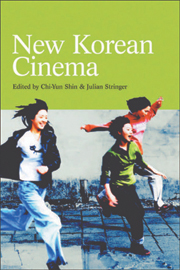Book contents
- Frontmatter
- Contents
- Notes on the Contributors
- List of Illustrations
- Introduction
- Part I Forging a New Cinema
- 1 Contemporary Cultural Production in South Korea: Vanishing Meta-Narratives of Nation
- 2 The Korean Film Industry: 1992 to the Present
- 3 Globalisation and New Korean Cinema
- 4 Chunhyang: Marketing an Old Tradition in New Korean Cinema
- 5 ‘Cine-Mania’ or Cinephilia: Film Festivals and the Identity Question
- Part II Generic Transformations
- Part III Social Change and Civil Society
- Glossary of Key Terms
- Bibliography of Works on Korean Cinema
- Websites
- Index
5 - ‘Cine-Mania’ or Cinephilia: Film Festivals and the Identity Question
from Part I - Forging a New Cinema
Published online by Cambridge University Press: 05 August 2013
- Frontmatter
- Contents
- Notes on the Contributors
- List of Illustrations
- Introduction
- Part I Forging a New Cinema
- 1 Contemporary Cultural Production in South Korea: Vanishing Meta-Narratives of Nation
- 2 The Korean Film Industry: 1992 to the Present
- 3 Globalisation and New Korean Cinema
- 4 Chunhyang: Marketing an Old Tradition in New Korean Cinema
- 5 ‘Cine-Mania’ or Cinephilia: Film Festivals and the Identity Question
- Part II Generic Transformations
- Part III Social Change and Civil Society
- Glossary of Key Terms
- Bibliography of Works on Korean Cinema
- Websites
- Index
Summary
Reprinted from UTS Review (now Cultural Studies Review) vol. 4, no. 2 (1998): 174–87.
© Soyoung KimRecognition or Refusal and Something Else
Organising the Women's Film Festival in Seoul during April of 1996, one among many film festivals launched in South Korea in the mid-nineties, I came to wonder about the ways in which certain Korean film festivals mobilise specific identities. In fact, each festival claims a raison d'être which includes not only the coverage of identity-oriented themes, but also the endeavour to construct a discursive space where the relevant issues can emerge and take shape.
Various factors have contributed to the recent proliferation of all kinds of film festivals in South Korea. First, there is cine-mania, the Korean version of cinephilia. Second is the enactment of a local self-government system. Third, there has been a shift in the site of Korean activism from the politico-economic to the cultural sphere. And last, there is the ambitious project of Saegaehwa, the Korean official version of globalisation. Saegaehwa was initiated with the establishment of civil government in 1991. It reverberates in 1997 as follows:
As the newest member of the Organization of Economic Cooperation and Development, and one of the world's strongest trading nations, the Republic of Korea will further accelerate Saegaehwa, its ambitious economic liberalization effort aimed at greater globalization. Saegaehwa will open the Korean market to foreign trade and investment and will further strengthen corporate Korea's role on the international business stage …
- Type
- Chapter
- Information
- New Korean Cinema , pp. 79 - 92Publisher: Edinburgh University PressPrint publication year: 2005



